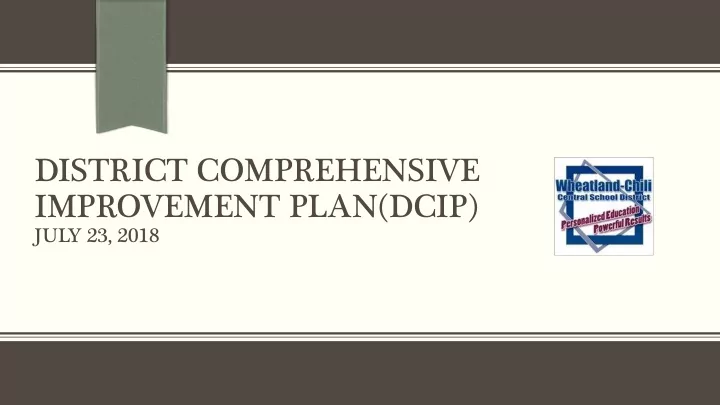

DISTRICT COMPREHENSIVE IMPROVEMENT PLAN(DCIP) JULY 23, 2018
MIDDLE STATES ACCREDITATION Pathway to Excellence: Plan for Growth and Improvement 2
FEDERAL ACCOUNTABILITY
The NYS Accountability Building Blocks 2018-2019 Transition 4-Year & 5-Year Graduation Rates Grades 3-8 and High School ELA Grades 3-8 and High School Math 4
Every Student Succeeds Act (ESSA) Transition year in 2018-2019 Districts designated as Focus Districts will continue with designation and DCIP Accountability for 2019-2020 will be based on 2017- 2018 data 2017-2018 data are not yet available T. J. Connor and the Middle/High School are Schools in Good Standing 5
District Designation: Focus District 3-8 ELA and Math Students with Disabilities subgroup Schools are in good standing 6
Diagnostic Tool for School and District Effectiveness (DTSDE): What are the essential components of effective schools? State tement ments of Prac actic tice 6 Tenets ets .1 district 1. District Leadership .2 vision/leadership 2. School Leader .3 resources curriculum people, budget 3. Curriculum (lesson that is designed before the teaching) .4 collaboration and capacity building 4. Teacher Practices (Instruction) .5 using data 5. Student Social Emotional 6. Family/Community Engagement 7
8
DISTRICT COMPREHENSIVE IMPROVEMENT PLAN Strategic Planning 9
Bringing it all together Leadership Team Tenet 1 Tenet 2 Tenet 3 District Technical Assistance Review/Children’s Institute Needs Assessment Tenet 4 Tenet 5 Communications/Engagement Committee Tenet 6 10
Needs Statement: The information gleaned from the DTSDE Self-Reflection, Create a clear and concise statement that District Technical Assistance Review, and Children’s Institute addresses the primary need(s) to be Needs Assessment, indicate that… addressed. Be sure to incorporate feedback from the most recent DTSDE review and other applicable data. SMART Goal: During the 2018-2019 school year, school leaders, in Create a goal that directly addresses the collaboration with District stakeholders, Needs Statement. The goal should be written as Specific, Measurable, Ambitious, Results- oriented, and Timely. Action Plan: What are the levers that will drive improvement? Identify action steps that will take place in order to achieve the identified SMART Goal. 11
DCIP Goals Tenet 1 (District Leadership): During the 2018-2019 school year, distric trict leaders' ders' commun unica ication tion of high expectations for improvement and deliver very of profe fessi ssiona onal develop elopment ent for scho hool ol lead aders rs and teach achers ers in the areas eas of progr gress ss monitorin itoring, g, socia ial and emotion ional learn rnin ing, g, stan andards-based based inst struc ruction tion, and family ly commun unica icati tion on and engag gagem emen ent, will result in increased student performance as measured by the New York State 3-8 ELA and math assessments and improved results on the District's Parent Customer Service (from 3.79 in 17-18 to 4.23 in 18-19 at T. J. Connor and from 3.69 in 17-18 to 4.02 in 18-19 at Middle/High School) and Communication Survey and the Community Communications and Engagement Survey (from 3.47 in 17-18 to 3.95 in 18-19). Tenet 2 (School Leader): During the 2018-2019 school year, school hool leade aders rs will streng ength then en the monitorin itoring, g, accou countabi tabili lity, ty, and communi unica cation tion of expecta ctation tions related to progr gres ess monito torin ring, g, social ial and emotional ional learnin rning, g, stan andar ards-ba base sed instru tructio ction, and famil ily commun unica ication tion and engag agem emen ent, resulting in increased student performance as measured by the New York State 3-8 ELA and math assessments, and improved results on the District's Parent Customer Service (from 3.79 in 17-18 to 4.23 in 18-19 at T. J. Connor and from 3.69 in 17-18 to 4.02 in 18-19 at Middle/High School) and Communication Survey and the Community Communications and Engagement Survey (from 3.47 in 17-18 to 3.95 in 18-19). 12
DCIP Goals Tenet 3 (Curriculum): During 2018-2019, the Standa andards ds-Ba Based sed Environ onme ment nt (SBE) BE) wal alkt kthrou ough gh tool will be used with fidelity, three times per week by six administrators, to collect data for analysis on a quarterly basis. By June 2019, District implementation of the walkthrough process with fidelity will result in teacher mean score of the Student Engagement Component in the Instruction Domain (3.c) of the Danielson Framework to increase from 3.6 to 3.7 (out of 4.0). Tenet 4 (Teacher Practices): Beginning in July 2018, the leadership team in collaboration with internal and external stakeholders will review the District's trict's data- driven en instru truction tion proce cesse sses an and protoc tocols, ols, resulting in consistent progress monitoring and improved student outcomes in ELA and math for students with disabilities as measured by New York State assessments: 10% of students will progress from Level 1 to Level 2 in 3-8 ELA and math and 5% of students will progress from Level 2 to Level 3 in grade 8 ELA and math. 13
DCIP Goals Tenet 5 (Student Social Emotional): During 2018-2019, the District will refine their plan to bett tter supp pport ort the behav avior oral al an and social al needs of stude udent nts, resulting in decreased behavioral referrals, decreased recidivism rates , and increased social and emotional skills as compared to baseline data collected from the recalibrated Code of Character, Conduct, and Support. Tenet 6 (Family/Community Engagement): During the 2018-2019 school year, Wheatland-Chili Central School District will continue to educa cate te an and empower ower fam amily ly an and comm mmun unity ity membe bers rs on relevant academic and social and emotional topics as evidenced by a 25% increase in participation at scheduled family and community engagement nights. 14
QUESTIONS 15
Recommend
More recommend